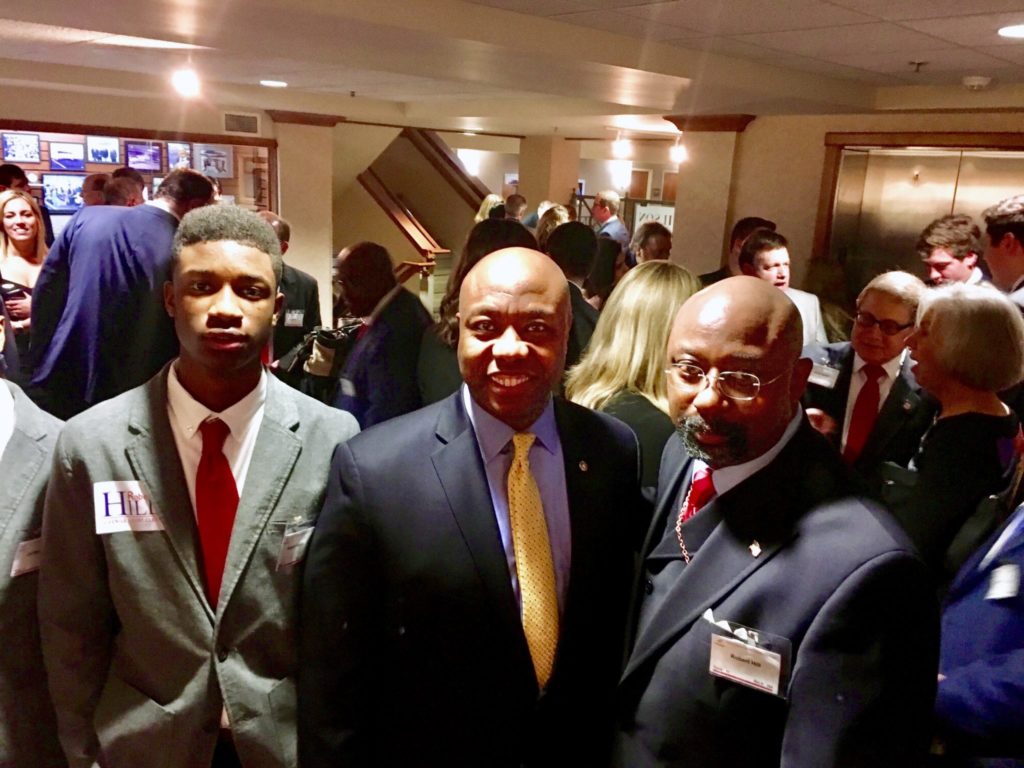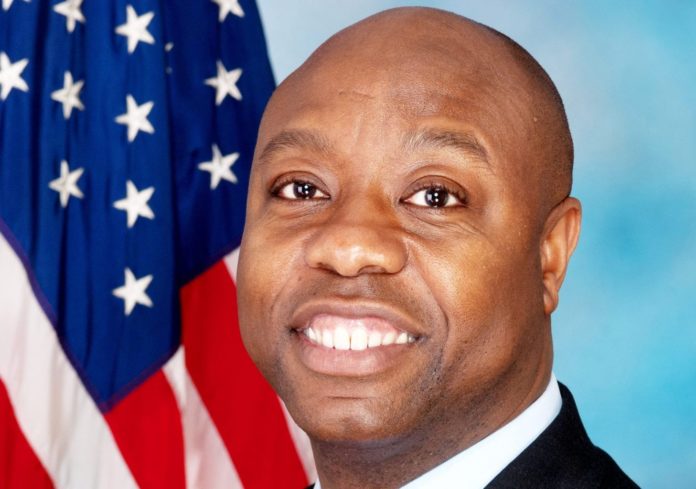
(Courtesy Photo)
Lee Mills knew the optics of this year’s Lincoln Day could not be ignored.
The 43rd annual Lincoln Day event, sponsored by the Shelby County Republican Party, hosted Sen. Tim Scott as keynote speaker. Scott also happens to be the first African-American U.S. senator from the state of South Carolina.
“We have not done a good job in reaching out to the black community,” said Mills, who serves as chairman of the Shelby County Republican Party. “Our candidates generally dominate in county elections, but not so much in the city of Memphis. County Mayor (Mark) Luttrell was successful in his election but only got 20 percent of the crossover vote. Our messaging to the black community has to improve if our numbers are to improve among minorities in Shelby County.”
In his speech, Scott touted the usual tenets of the Republican platform —smaller government, lower taxes, free markets, welfare reform and a security-first immigration policy. While the speech itself was unremarkably conservative, Scott’s personal story is anything but.
“I grew up poor in a single parent household in North Charleston, South Carolina,” Scott said. “My mother tilled the soil. Sometimes, the soil was difficult, hard to turn. But she taught me responsibility and hard work. John Moniz, my mentor, dropped the seeds in fertile ground, and they germinated. John was a blessing from God.”
Scott built one of the most successful Allstate Insurance agencies in the state of South Carolina. He is revered, not only by Republicans across the nation, but greatly admired by African-American Republicans as their ultimate example.
Robert Hill, executive director of Shelby County governmental and legislative affairs, brought his two sons to hear Scott. “I want my boys to know what is going on politically,” said Hill. “Senator Scott believes in having children grow up hearing what we believe in. It’s good for children to understand and see how things are.”
Hill is looking to emerge from a field of candidates running for Juvenile Court Clerk. His “Black Republicanism” in Shelby County has generally been treated with bafflement by other African-Americans.
“When I vote in the primaries and I come in asking for a Republican ballot,” Hill said, “there is always some issue. One lady who was working the poll said, ‘Are you sure that’s what you want?’” Hill is often found explaining his party affiliation to some who may inquire.
“I am a fiscal conservative and not a social conservative,” Hill said. Simplified, this means he believes the government should be conservative in spending, but that civil rights should be protected and championed on every level.
“We must show some responsibility and self-determination on our own,” said Hill. “You see men begging in front of a store, asking a woman for a handout. There was a time when you would never see something like that. We must have some kind of dignity about ourselves.
“I grew up in Marshall County and my parents were farmers. We worked in the fields and raised our food. It was stored up to carry us through the winter. We were poor, but we never begged for a handout. Our people have lost the pride we once had.”
Hill’s training as a pastor has enhanced his work as a grassroots organizer throughout Memphis and Shelby County. He said his work has helped small businesses to grow locally.
“I’m running for Juvenile Court Clerk. I’m not running against anyone, but I’m simply running on my own record and the belief that our children need an advocate in that position. I believe that I am the best person to fill that office,” said Hill.
Mills laments that the messaging coming from Republicans has not been the best.
“The media has been able to characterize our party as a party of predominantly white men who are racist and homophobic,” said Mills, “and that has essentially stuck. We must do a better job reaching out to minorities and women. That’s where we are now in Shelby County.”
Black Republicans: More of the story
After the Civil War, most African-Americans were associated with the Republican Party. It was started by a group of abolitionists and the party of Lincoln.
But things began to change during the Great Depression of the 1930s with President Franklin Roosevelt’s New Deal, a program that helped disadvantaged and minority communities find work. About 71 percent switched to the Democratic Party.
In 1948, another Democratic president, Harry S. Truman, ordered the desegregation of the military and signed an executive order against racial discrimination in federal employment, helping to retain much of the “black vote.”
According to Harvard professor Leah Wright Rigueur, who authored a book, “The Loneliness of the Black Republican,” “the friction between much of black America and the Republican Party, particularly regarding civil rights legislation and social programs, makes the position of the black Republican all the more difficult.”
For instance, a 2015 poll showed that “66 percent of white Republicans felt that the justice system treated African-Americans equally, compared to 10 percent of black Republicans.”
The number of police shootings by whites in the party were seen as just unfortunate incidents, rather than the result of systemic racist perceptions of black people by law enforcement.



